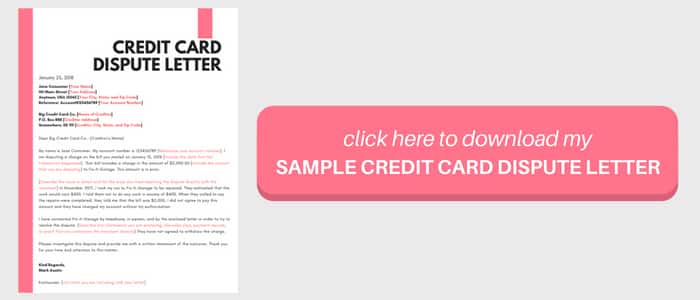
This is article three of Part Two of the “Conquering Debt Series.” Read Part One here.
Have you ever experienced a problem with your credit card bill? Have you ever had mysterious charges, double-billing, or mail-order merchandise that never arrived?
These types of errors can be frustrating, but they can also be corrected. It takes a little patience and knowledge of the dispute settlement procedures provided by the Fair Credit Billing Act (FCBA).
Here are three separate protections you need to know about.
UNAUTHORIZED USE OF YOUR CARD
The first credit card protection you need to know about shields you against liability for unauthorized use of your credit card, that is, when someone steals, borrows, or otherwise uses your card or card number without your permission.
With identity theft, these problems have increased as hackers have become more sophisticated in stealing credit card numbers from the computers of businesses.
Under the law, your liability for unauthorized use of your credit card is limited to $50. No matter how much the thief has charged on your card, your credit card lender can only charge you a maximum of $50.
Things can get a lot trickier when someone you know used your card. In general, you should not be held liable if you did not authorize this use. But if you gave your son your credit card, for example, you are liable for any charges he runs up even if you told him only to use it for emergencies.
Now, if your son took your card without your knowledge or permission, the law limits your liability in the same way as if your card was lost or stolen.
It's always important to monitor your credit card activities closely. As soon as you know of any unauthorized use of your credit card, you need to call the lender to make a report. If you can call before unauthorized charges are incurred, you cannot be charged even $50, since the lender can take steps to cancel your card and send you a new one.
If your credit card lender tells you that they can only report unauthorized use by sending a written dispute within sixty days of receiving the bill with the authorized charge, this is not true! If a charge unexpectedly appears on your statement for something you did not approve, you have a right to dispute the charge. You can report the unauthorized charge over the phone, and you are not required to do it within sixty days (although the sooner you report it, the better.)
After you report an unauthorized charge, the credit card lender must conduct a “reasonable” investigation of your claim. There are some cases where the lender will simply decide to take the charge off your account. A reasonable investigation might include analyzing the signature on the credit card slip, obtaining a copy of a police report, or comparing where a purchase was made versus where you live.
BILLING ERROR DISPUTES
The second type of credit card protection involves disputes about your bill. This might include a merchant overcharging you or charging you for products you never received.
A law called the Fair Credit Billing Act forces lenders to follow specific “billing error” procedures to resolve a dispute. Keep in mind that this law does not apply to debit cards.
Under this law, you must raise a dispute in writing to your credit card company, usually by sending a letter. Calling on the phone does not count as a billing error dispute.
The letter must be sent within sixty days of the first bill with the improper charges. It must include the following information:
- Your name and account number
- The dollar amount you dispute
- A statement of the reason for your dispute
You must send your letter to the address provided by the lender for this purpose. You usually need to send the letter by mail, but if a lender lists an email or website address to submit a dispute, you can use those methods too. You can find the information about this address and how to raise a dispute on the back of your credit card statement.
The law only permits you to raise certain types of disputes using the billing error procedure. Some examples of reasons for dispute are:
- I did not authorize this charge (remember, you can raise the issue of unauthorized use by sending a written billing error notice, but you can also report unauthorized use over the phone too!)
- I did not receive the goods I ordered.
- I returned the products I ordered because they were defective but did not get a credit.
- The merchant sent me the wrong goods.
- The merchant did not complete the services I contracted for or performed them incompletely.
- The merchant billed me for an amount higher than I agreed to pay.
- I canceled the contract with the merchant or contractor before the work was performed.
- Although I agreed to buy something from this merchant, I did not authorize them to bill my account.
You cannot raise a complaint about the quality of the merchandise or services you bought with a credit card in the form of a billing dispute. However, you can withhold payment to your credit card lender for poor quality goods or services in many cases, which is the third type of protection discussed below.
It's essential to send any backup information with your dispute letter, such as a letter explaining the problem to the merchant. Once you have raised a dispute, the credit card company has two complete billing cycles or within ninety days (whichever comes first), to report back to you in writing.
In some cases, the charge will be canceled. Any interest associated with a successfully disputed debt must also be canceled. If the charge is canceled, the lender is prohibited from reinstating the charge. If the company fails to resolve your dispute within the required timeframe, it must cancel the charge and associated interest.
Do not pay the disputed portion of your bill until the dispute is resolved. Just make sure you make a payment to cover any undisputed amount. The credit card can not report you as delinquent with respect to the disputed amount but may do so if part of your debt is undisputed and you do not make the necessary payments.
When you raise a written dispute with a credit card lender about a charge, the lender is required to investigate. You do not need to pay the disputed portion of the bill during the investigation.
If the credit card company does not resolve your dispute in your favor, it must send you a written explanation and give you any supporting documentation up your request. It must allow you the grace period normally permitted for the charge (unless you made the dispute after the grace period).
If you would like access to my FREE sample credit card dispute letter so you know exactly what to send to your credit card lenders, you can access it in my free resource library! It's a word document that's completely customizable!
STOPPING PAYMENT ON YOUR CREDIT CARD
The third significant credit card dispute protection is the right to stop payment. Stopping payment is a very powerful tool that you can use when you are dissatisfied with something you bought with your credit card.
You can use this strategy if you have a legitimate complaint about the quality of goods or services you bought with the card and you first make a good faith effort to resolve the problem with the merchant directly.
Here are a few other important limits to the stop payment right:
- The goods or services you bought must have cost more than $50.
- You must have bought these goods or services in your home state or within 100 miles of your mailing address.
However, the two limits mentioned above do not apply if the credit card was issued by the seller (such as a department store credit card) or if the seller mailed you the advertisement for the goods or services you purchased. You still need to make a good faith effort to resolve the problem with the seller in these cases.
After you notify your credit card company that you are withholding payment, they cannot report the disputed amount as delinquent to a credit bureau until the dispute is settled or a court judgment is issued against you.
The lender cannot treat the dispute as “settled” or take collection action against you unless it has completed a reasonable investigation of your claim.
HOW TO ENFORCE YOUR CREDIT CARD DISPUTE RIGHTS
In most cases, a credit card dispute will be resolved after you contact the credit card company. However, if the company does not respond to your dispute or are not satisfied with the results, there are additional steps you can take beyond just raising your complaint to the company.
COMPLAIN TO THE CFPB. The Consumer Financial Protection Bureau (CFPB) is a new agency created to protect consumers of financial products and services. The CFPB oversees banks with over $10 billion in assets, which includes nearly all of the major credit card lenders. TheCFPB started accepting credit card complaints in June 2011. It has an easy-to-use, online complaint system at www.consumerfinance.gov/complaint.
You can also file a complaint by mail with the CFPB at the following address:
Consumer Financial Protection Bureau
P.O. Box 4503
Iowa City, Iowa 52244
FAX: (855)237-2392
PHONE: (855)411-2372
SUE THE COMPANY OR TAKE THEM TO ARBITRATION. Federal law permits you to sue the credit card company if it does not follow the dispute procedures discussed in this article or takes some action forbidden by law (such as reporting a disputed amount as delinquent to a credit bureau).
A mandatory arbitration provision may limit your right to sue. Have you ever seen one of those little bill stuffers with tiny print that comes with your credit card bill? Most credit card companies slip these provisions into their contract, but few consumers ever read the tiny print. This prevents you from suing a credit card company in court. Instead, you must use a private company to resolve your claim.
A word of caution. If you are forced to use the arbitration process, make sure to have the company agree to pay the costs. Arbitration is costly, with filing fees that usually cost $100-$200 and daily fees up to $1,000 per day.
Disclaimer: The article and information provided here is for informational purposes only and is not intended as a substitute for professional advice.


